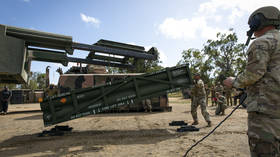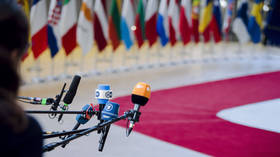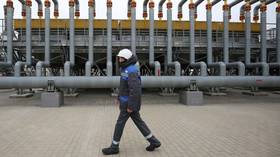Prague missile deal could force Moscow’s hand
Moscow is warning that the missile defence deal signed between the U.S. and the Czech Republic could force it into making a military response. The Foreign Ministry says if the treaty to put a missile shield in Eastern Europe is ratified, Russia would have
Reacting to the signing of the agreement in Prague, the Foreign Ministry also said the agreement would hamper European and global security.
The U.S. Secretary of State Condoleezza Rice signed the deal on an anti-missile radar base with her Czech counterpart, Karel Swarzenberg, in Prague on Tuesday.
In a statement published on the Russian Foreign Ministry website, defence officials said the treaty compelled Russia to take non-diplomatic measures.
“If the agreements with the U.S., subject to ratification by the Czech parliament, become legally binding, and if the real deployment of the U.S. strategic missile defence system begins near our borders, then we will have to respond using not diplomacy but military-technological methods,” the published statement said.
The deployment of American anti-missile elements in Eastern Europe is strongly opposed by Russia, which considers them a threat to its security.
Moscow's proposals to create a joint security system still stand says the Foreign Ministry. Russia has offered the U.S. the joint use of its radar stations in Armavir in southern Russia and Gabala in Azerbaijan as alternatives to the East European shield. But Washington has declined the offers saying these stations could only be used as “supplements”.
The U.S. says a missile defence shield in Eastern Europe will prevent any future attacks on the U.S. from countries like Iran and North Korea.
According to recent polls, the plan is opposed by 70 per cent of the Czech population. Around 1,500 people have taken to the streets in the centre of Prague to protest missile defense plans.
The treaty also promises Washington will protect the Czech Republic from possible missile attacks by terrorists.
Condoleezza Rice has heralded the signing of the installation agreement between American and the Czech government as a “victory of democracy”. Earlier she said that the deal “not only guarantees security for the U.S. and the Czech Republic, but all of the states in the region.”
“This is a very important system for Europe. Weapons of mass destruction and their means of delivery are proliferating in the modern world. If there are no immediate threats today, they will emerge in the future,” Karel Schwarzenberg said.
Leaders of the Czech parliamentary opposition have boycotted the signing ceremony.
However, the agreement does not mean the radar base is a foregone conclusion. The treaty also needs to be signed by the Czech president and approved by the parliament which is split over the issue. The parliament will start the ratification process of the agreement in the autumn.
State Duma deputy, Gennady Gudkov, suggested the radar could pose a threat to Russia's security.
“We understand today this radar is not aimed at Russia. But who knows what will happen tomorrow. Retargeting a radar takes weeks. As for the further placement of parts of the anti-missile defence, Russia considers it could lower its own military potential,” he said.
“The Czech government has made clear its intention is to make sure that the U.S. Star Wars radar is placed in our country. So this signing is just an approval of these intentions. Fortunately, it’s not up to the government to decide. The agreement has to be ratified by the Czech parliament. And the situation there is far from clear. Right now it doesn’t seem that the government has the necessary majority to pass this treaty,” said Jan Tamas, Head of the “No to the Base” movement. Watch VIDEO.
An activist from the “No to the Base” group, Jan Majicek, pledged they will continue their protests. “For us nothing is changed by the signing of this treaty,” he said. “We don’t believe in this ideology of the war on terrorism. There’s no proof that Iran is an enemy,” he added, citing recent reports by the International Atomic Energy Agency. Watch VIDEO.
The move is not a big surprise for Russian policy makers, and now it's high time for them to thing what to do next, says Deputy Director of the Institute of USA and Canada, Victor Kremenyuk. Watch VIDEO.
Russia's spared no effort to avoid this unfortunate development, says political analyst Victor Linnik. In his opinion, the positioning of AMD bases in Eastern Europe is to detect what Russian strategic activities might be in the forseeable future, and this changes the security situation in the whole of Europe. Watch VIDEO.
If the issue of AMD is not solved between Russia and the U.S. with the current American administration, the new president of the U.S., whether Republican or Democratic, may revise its position on radars and launch sites in Europe, thinks Viktor Mizin from the Institute of Strategic Analysis. Watch VIDEO.
Irina Kobrinskaya, a political analyst from the Moscow-based Institute of World economy and International relations, says the earlier postponement of AMD by Poland is a sign that this is a an all-European security matter and is to be decided by all European countries, including Russia. Watch VIDEO.
Aleksandr Pikayev, political analyst from the Institute of World Economy and International Relations said the vote in the Czech Parliament could split the governing coalition and cost the government ministers their posts. “It’s difficult to say whether the Czech Government will be able to implement the agreement, to get to its ratification, or if it will be able to survive the ratification,” he said. Watch VIDEO.
The Czech Government should first of all consult its people and hold a referendum on the deployment of the bases, as the Czech people don't feel the threat of Iran, rather they feel the threat of aggravating relations with Russia, says political analyst Aleksei Arbatov. Watch VIDEO.












